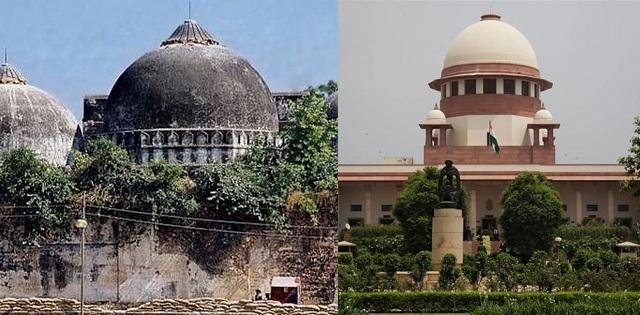Ayodhya Case: SC Asks How Birthplace Can be Made Party to Land Dispute

Image Courtesy: Jagran Josh
New Delhi: The Supreme Court on Thursday asked 'Ram Lalla Virajman', one of the parties in the politically sensitive Ram Janmabhoomi-Babri Masjid land dispute at Ayodhya, as to how the birthplace of the deity can be regarded as a "juristic person" having stakes in the case.
The apex court, which was hearing the case on the third day, said that so far as Hindu deities are concerned, they have been treated as juristic person in law which can hold properties and institute a litigation.
A five-judge Constitution bench headed by Chief Justice Ranjan Gogoi, however, asked senior advocate K Parasaran, appearing for 'Ram Lalla Virajman', as to how 'Janamsthanam' (birthplace) can file a suit in this matter as a party.
"Whether the birthplace can be held to be a juristic person. So far as idols of deities are concerned, they had been held to be a juristic person," said the bench, also comprising Justices S A Bobde, D Y Chandrachud, Ashok Bhushan and S A Nazeer.
Responding to the query, Parasaran told the bench, "In Hindu religion, idols are not necessary for a place to be regarded as a holy place of worship.... Rivers and Sun are also worshipped in Hinduism and birthplace in itself can be treated as a juristic person."
The lawsuit filed by the deity in the Ayodhya case has also made the birthplace of Lord Ram as one of the parties.
The bench then referred to a judgement of the Uttarakhand High Court in which the holy river Ganga was held to be a juristic entity entitled to pursue the litigation.
"The Uttarakhand High Court has said that the rivers are also juristic entities capable of being a party in the case," the bench observed.
The bench then asked Parasaran to proceed with his submissions on other issues.
Parasaran alleged that the deity 'Ram Lalla Virajaman' was not made a party when the magistrate had attached the disputed site and when the civil court granted injunction by appointing receiver in the case.
Highlighting the importance of birthplace, Parasaran recited a Sanskrit Shloka, 'Janani janmbhoomis cha swargadapi gariyasi', and said that a birthplace is greater than heaven.
At the outset, senior advocate Rajeev Dhavan, appearing for a Muslim party, said that the two separate lawsuits filed by 'Ram Lalla Virajman' and 'Nirmohi Akhara' respectively are at "loggerheads" of each other and if one is allowed then other goes automatically.
He suggested that the Muslim party can be asked to advance submissions in either of the lawsuits as only can be allowed legally.
Fourteen appeals have been filed in the apex court against the 2010 Allahabad High Court judgment, delivered in four civil suits, that the 2.77-acre land in Ayodhya be partitioned equally among the three parties -- the Sunni Waqf Board, the Nirmohi Akhara and Ram Lalla.
On December 6, 1992, the Babri Masjid, constructed at the disputed site in the 16th century by Shia Muslim Mir Baqi, was demolished.
Get the latest reports & analysis with people's perspective on Protests, movements & deep analytical videos, discussions of the current affairs in your Telegram app. Subscribe to NewsClick's Telegram channel & get Real-Time updates on stories, as they get published on our website.
























